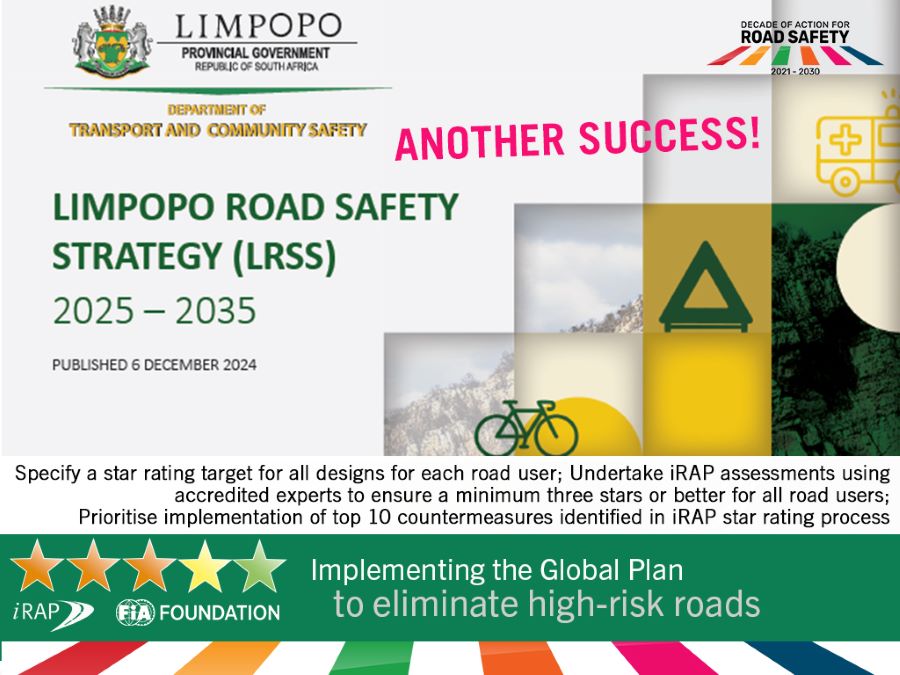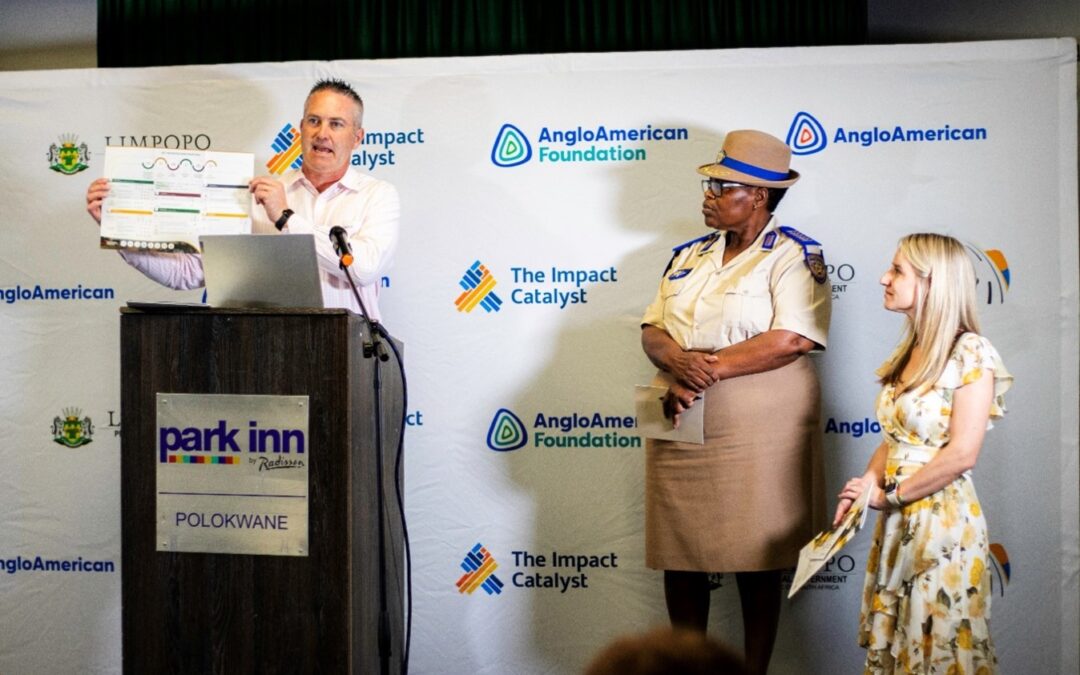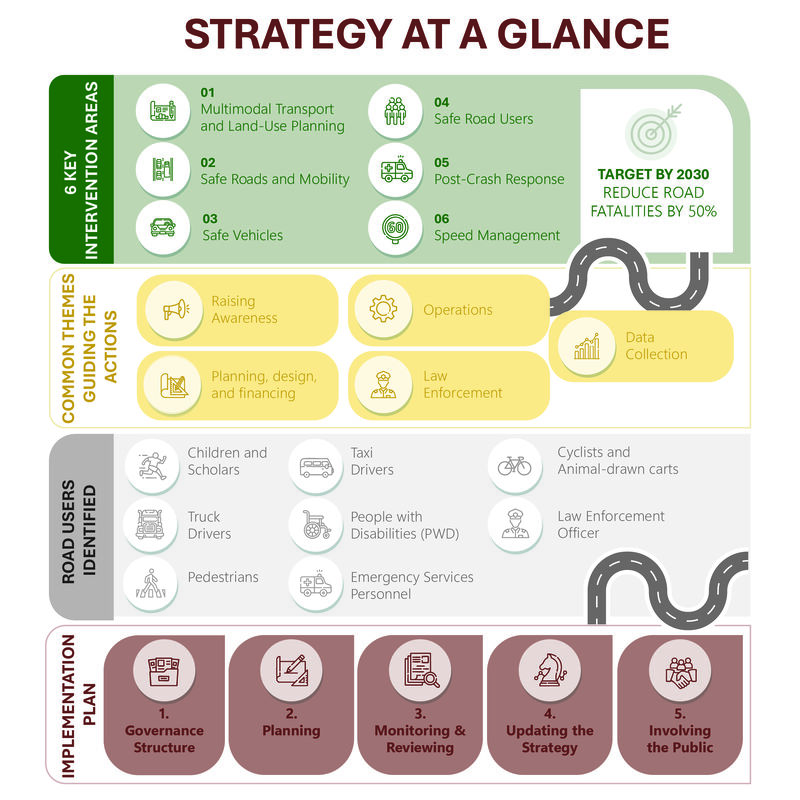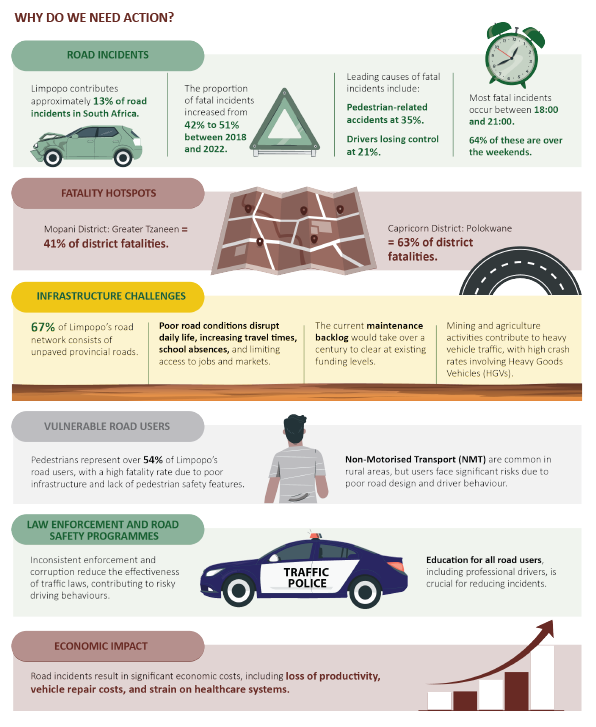LRSP Programme Manager, Dr Jonathan James, showcases the Limpopo Road Safety Strategy Booklet at Limpopo Road Safety Strategy Ceremony in Polokwane
The Limpopo Road Safety Programme (LRSP), an initiative funded by the Anglo American Foundation and implemented by Impact Catalyst, launched the Limpopo Road Safety Strategy for 2025-2035 in Polokwane last week, including iRAP priorities and key performance indicators to achieve safer roads and mobility across the South African province.
To identify and address high risk road infrastructure locations, the Strategy includes the following interventions:
- Specify a Star Rating target for all road designs linked to each road user, and the desired safety performance standard at the location
- Undertake iRAP assessments using accredited experts to ensure a minimum three stars or better safety standard for all road users is achieved
- Set a performance target for each road user based on the assessment results with clear measurable metrics at the road-attribute level (e.g. sidewalk provision)
- Prioritise implementation of the top 10 countermeasures as identified in the iRAP Star Rating Process
Performance indicators are set to track the:
- Number of road authorities/staff trained in road safety assessment (iRAP, road safety audits)
- Number of road safety audits and iRAP assessments completed
The Strategy has collaboratively incorporated inputs from a range of Departments in Limpopo, aims to address the province’s road fatalities and injuries through a holistic and practical approach, from planning to implementation. The Limpopo Department of Transport and Community Safety (LDTCS) will be the primary custodian of the strategy.
It is endorsed by the Limpopo Office of the Premier (OTP) and is designed to align with the planning of the National Department of Transport (NDoT) through the National Road Safety Strategy (NRSS). The South African NRSS strives to reduce road fatalities by 50% by 2030. Therefore, the development of a Limpopo-focused strategy positions the province as a leader in road safety, with the first updated provincial road safety strategy in South Africa aligned to the NRSS.
The Strategy outlines six key focus areas: improving multimodal transport, enhancing road infrastructure, increasing vehicle safety, encouraging behaviour change, improving traffic law enforcement, strengthening post-crash response, and managing speed.
These interventions align with international best practices, such as “Vision Zero”, “Sustainable Safety”, and the “Safe System Approach” (SSA). These intervention-based methods aim to eliminate traffic fatalities and serious injuries through a multifaceted approach addressing road infrastructure, human behaviour, vehicle safety, law enforcement, and post-crash care.
iRAP in Limpopo
iRAP has been supporting two significant road safety projects this year, as part of the Limpopo Road Safety Programme, funded by Anglo American Foundation, and supported by iRAP Accredited Practitioner ARRB Systems. The projects have involved the provision of iRAP training to build local capacity and the assessment of 1,000km of roads and 20 high-risk schools. Their results are informing evidence-based safety improvements to high-risk locations, and will support implementation of the new Strategy in the decade ahead.
Understanding the Safety of Road Networks in Limpopo Province
Limpopo, like many provinces in South Africa, struggles with a high number of road incidents that have far-reaching consequences for individuals, communities, and the economy.
Road traffic crashes not only cause tragic loss of life and severe injuries, but they also drain local economies as families lose their primary breadwinners, and businesses face rising costs from loss, damages and healthcare needs.
Between 2018 and 2023, the LDTCS recorded a decrease in road incidents by almost a third. However, available data indicates that road incident fatalities have been increasing.
Human factors remain the highest contributors towards fatal incidents, the largest portion involving pedestrian road users. Most incidents occur over weekends from Fridays to Sundays, during late afternoon and early evening hours, peaking at 18h00 to 20h00. The largest portion of fatal incidents occur between 18h00 and 19h00, when visibility decreases and there is less visible law enforcement.
In an effort to address these challenges, the LRSP conducted safety assessments on 1,001 km of Limpopo roads, using tools to enhance road safety planning and interventions. The iRAP star rating system (1-5) was applied to prioritise roads needing urgent attention. Among the roads assessed were the R508, R561, R572, R528, R81, R516, N11, R527, R519, R525, R531, R555, R579, R510, R522, R518, Marblehall-Phetwana, Vaalwater–Melk River, and Pala Camp–Keisel.
During a media briefing, Ms Talia Ismail, a Senior Road Safety Technician from ARRB Systems, highlighted several high-risk roads rated 1 or 2 stars, indicating the need for urgent improvements. For instance, the R81 received a 1-star rating for both vehicles and pedestrians, while the R522 and R525 presented significant crash risks.
Insights from these assessments will guide interventions by the LDTCS in a coordinated effort to reduce road fatalities, particularly during the festive season and beyond.
Looking Ahead in 2025
Dr Jonathan James, LRSP Programme Manager, emphasised that the LRSS sets Limpopo “ahead of the curve” in tackling road safety challenges. By integrating proven global strategies, the initiative strives to make significant strides in reducing road-related casualties.
Mr Stephen Matjena, Head of the Limpopo Department of Transport and Community Safety, reiterated the province’s commitment to reducing road incidents, acknowledging the significant work is still required. With the festive season approaching, collaboration among stakeholders will be crucial to promoting safer roads for all users.
“The wheels have been set in motion through this programme, particularly for 2025. However, we recognise that addressing road safety requires more than just a corporate intervention. It equally demands a close collaboration between private sector, public sector and civil society. That is why the Anglo American Foundation stepped in to fund the LRSP – which is an initiative designed to tackle road safety challenges holistically,” emphasised Ms. Lishoka Ndyamba, Anglo American Principal: Socio-Economic Development & Collaborative Regional Development.
For more information:
- Download the Strategy here.
- Watch the media briefing and the Limpopo Road Safety Strategy Handover Ceremony video recording here. The briefing provided insights into the LRSP’s achievements in 2024 and presented the new Strategy, outlining plans for road safety initiatives in 2025.
- Read more on the iRAP Limpopo Projects supported by Anglo American Foundation, launched in April, here.
- For LRSP and media enquiries, contact Chumisa Ndlazi, Communications Specialist, email chumisandlazi@ImpactCatalyst.co.za
Highlights reel of the Limpopo Road Safety Strategy Showcasing Ceremony and Media Briefing held on 6 December 2024 (Credit: Impact Catalyst)




















